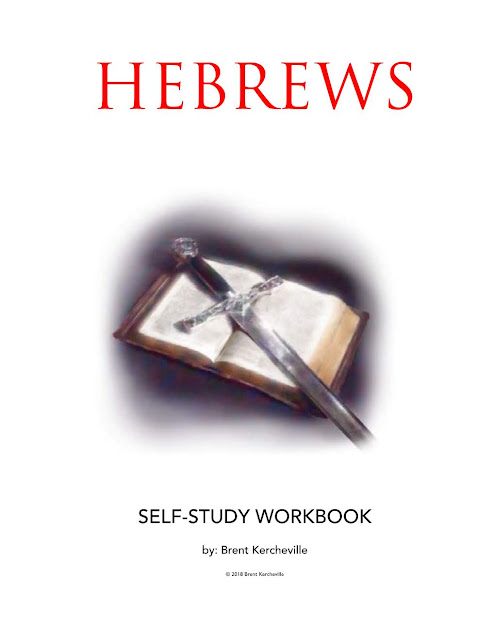Hebrews Chapter Seven Verses 11-19
HEBREWS CHAPTER SEVEN VS 11-19 (USING KING JAMES STUDY
TEXT, STUDY BOOK WILL REFERENCE A DIFFERENT VERSION FOR READING)
Heb 7:11 If therefore perfection were by the Levitical priesthood, (for
under it the people received the law,) what further need was there that another priest should rise
after the order of Melchisedec, and not be called after the order of
Aaron?
Heb 7:12 For the priesthood being changed, there is made of necessity a
change also of the law.
Heb 7:13 For he of whom these things are spoken pertaineth to another
tribe, of which no man gave attendance at the altar.
Heb 7:14 For it is evident that
our Lord sprang out of Juda; of which tribe Moses spake nothing concerning
priesthood.
Heb 7:15 And it is yet far more evident: for that after the similitude of
Melchisedec there ariseth another priest,
Heb 7:16 Who is made, not after the law of a carnal commandment, but
after the power of an endless life.
Heb 7:17 For he testifieth, Thou art
a priest for ever after the order of Melchisedec.
Heb 7:18 For there is verily a disannulling of the commandment going
before for the weakness and unprofitableness thereof.
Heb 7:19 For the law made nothing perfect, but the bringing in of a
better hope did; by the which we draw
nigh unto God.
Main Point: The priesthood of Jesus is eternal (spiritual), as is exampled in the order of Melchizedek. His appointment required a change of order (from Levi to Judah). Jesus’ priesthood draws us nearer to God, something the law could not do.
3. Why was the priesthood changed from the
Levitical order, to the order of Melchizedek? 11) (paraphrase)- the law
could not perfect the one under its subjection 16) ….not after carnal
commandment, but after the power of endless life. 19) For the law made nothing
perfect. The Levitical order dealt with the transient life, which held no hope
for after life. It was simply an instrument for everyday physical living. The
priesthood of Melchizedek embodies the concept of eternal life….and as such,
affords hope on a much deeper level.
4. Why was the law weak and unprofitable?
What purpose did the law have, according to the text? The Levitical order
dealt with the transient life, which held no hope for after life. It was simply
an instrument for everyday physical living. The text actually does not spell
out what the purpose of the law was. It does make it clear that it could not
perfect the one under its rule. *And by contrast, if the new order DRAWS them
near to God, the old order kept them aloof from God. *Arguable when we consider
David’s psalms praising God’s laws. The system of law may have had a negative
effect, but not from any fault of God’s doing.
5. According to this section of text, what
about Christ and His priesthood is better than the Levitical priesthood? *By
contrast, if the new order DRAWS them near to God, the old order kept them
aloof from God. *Arguable when we consider David’s psalms praising God’s laws.
The system of law may have had a negative effect, but not from any fault of
God’s doing.
We must be
careful when reviewing and/or criticizing the system of law. If God set up a
system where man could not be drawn to him and mankind would suffer for it, that
makes God unjust. (Which is an impossibility)
The laws God dispensed were never meant to draw mankind. It has always been His grace that he has sought us out.
The laws God dispensed were never meant to draw mankind. It has always been His grace that he has sought us out.
Additional:
11) – Perfection –
again, means completion – indicating that
the old testament covenant was not a sum total agreement
12) Change 3346_ From G3326 and G5087; to transfer, that is,
(literally) transport, (by implication) exchange,
(reflexively) change sides,
The
writer sets up thought to accept a CHANGE. Which could easily be rejected, but
because of the ORDER by which this change took place, there can be no argument.
The writer has already soundly illustrated the superior order of Melchizedek over
the Levites….Jesus belongs to that order. This closes any argument against the
priesthood of Christ needing to be within the Levite tribe.
18)
disannulling – 115 From G114; cancellation
19)
better – 2909 - Comparative of a derivative of G2904;
stronger,
hope – 1680 - Fromἔλπω elpō which is a primary word (to anticipate, usually
with pleasure); expectation (abstract or concrete) or confidence: -
Verse
17 references the Psalm below. What is the writer saying in its original
context? How could he say it truthfully if he is not a priest?
Psa 110:4 The LORD has made a promise that
will never be broken: "You will be a priest forever, just like
Melchizedek."
PRIEST-H3548
- Active participle of H3547; literally one officiating, a priest; also (by courtesy)
an acting priest (although a layman): - chief ruler, X
own, priest, prince, principal officer.

Comments
Post a Comment